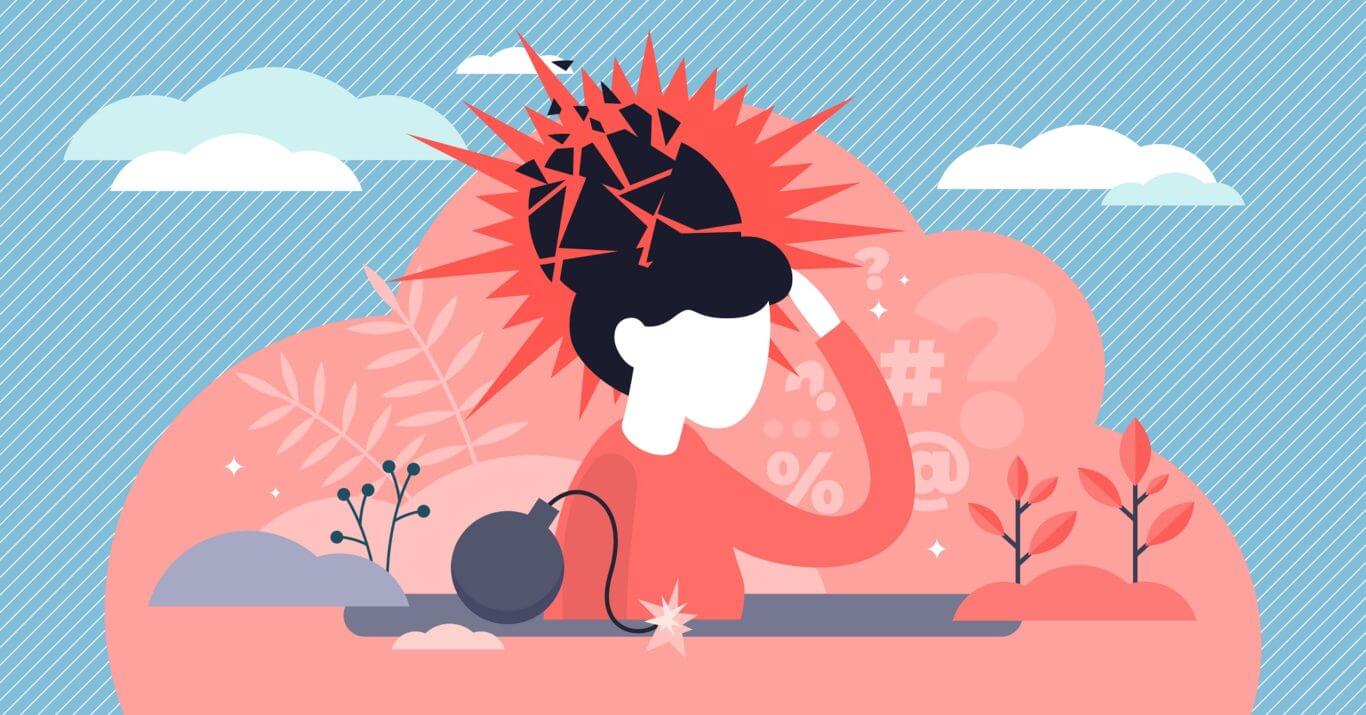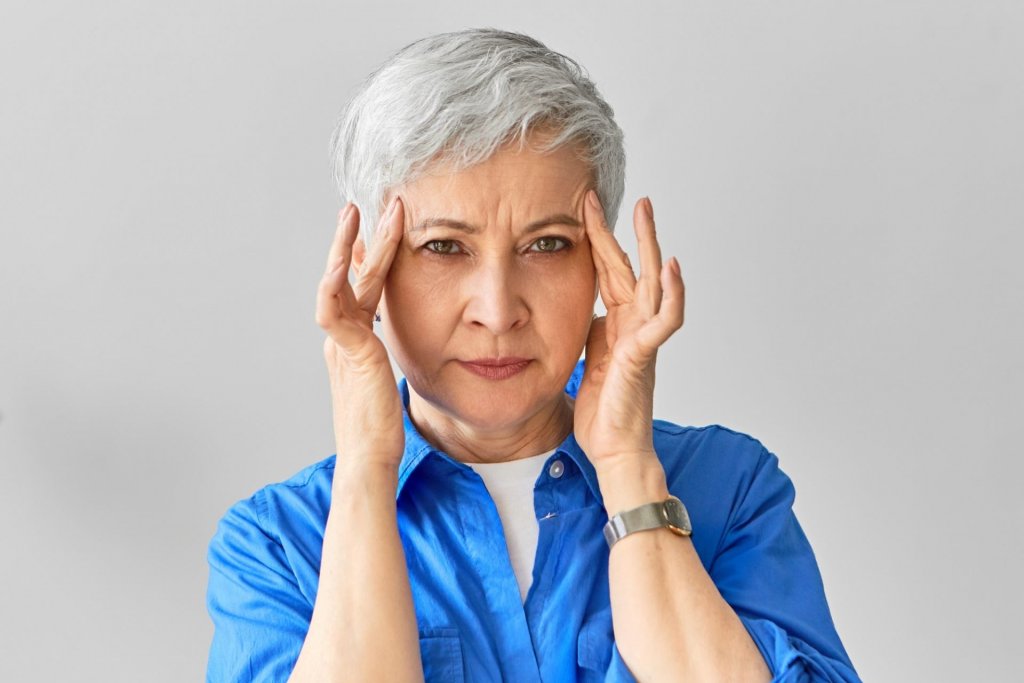
How Anxiety Affects Brain Health: Long Term Impact and 7 Natural Ways to Cope


Worry and everyday stressors are common triggers for anxiety, a condition that ignites areas of the brain responsible for detecting and responding to real-life threats. Anxiety affects brain health because it produces the “fight-or-flight” response, which can “make the heart pound and breathing quicken.”
Anxiety disorders are the most common mental health concern in the U.S., affecting 40 million adults. Those who live with anxiety are all too familiar with the cascade of physical symptoms, from a racing heart to sweating to hyperventilating.
What you may not realize, however, is that all those episodes of anxiety may be harmful to the brain, especially if the anxiety goes untreated for a long period.

What Is Anxiety and How Does it Affect the Brain?
Anxiety is a feeling of worry, dread, or nervousness. It is an emotional and physiological response to an impending event or an uncontrollable situation. In severe cases, this state of apprehension can lead to compulsive behaviors or panic attacks.
It’s perfectly normal to experience some degree of anxiety in certain situations, like having to give a speech in front of an audience or taking a test.
When anxiety becomes chronic and excessive, or interferes with your quality of life, that’s when the brain begins to experience its negative effects.
Common Causes of Anxiety and Brain Dysfunction
Several variables can lead to chronic anxiety:
- Genetics
- Brain dysfunction or injury
- Post-traumatic stress syndrome
- Environmental stressors like abuse and neglect
- Substance abuse
- Medical conditions like thyroid disease
- Repetitive negative thinking
How Anxiety Affects Brain Health (and the Fight or Flight Response)
When a person experiences anxiety, the brain’s amygdala, hippocampus, and prefrontal cortex (PFC) become hyperactive.
These parts of the brain are responsible for sensing danger, whether that danger is real or imagined. They trigger a surge of adrenaline and cortisol (the stress hormone) throughout the body in response to that perceived danger. This activates the fight-or-flight response.
The reaction serves the body well in a truly life-threatening situation because the adrenaline and cortisol allow the body to react quickly with heightened awareness. In these cases, the brain is doing exactly what it’s designed to do to protect the body.
However, your brain’s well-equipped, danger-interpreting processes may be impaired by unhealthy reasoning and inappropriate thought responses. How your brain interprets the perceived threat will dictate how well you can quell the fight-or-flight response and return to a state of calm.
Excessive and prolonged anxiety affects brain health by producing an overabundance of stress hormones. This can ultimately lead to panic attacks, a more severe side of anxiety.
An overly anxious brain becomes much like the boy who cried wolf: always on high alert for incoming danger, despite many false alarms. In this heightened state, the brain has a harder time reasoning rationally and is less able to interpret real-life danger.
What Research Says about Anxiety and Brain Health
Studies illustrate that stress reduces hippocampal volume. The hippocampus processes long-term and contextual memory, so persistent anxiety can impact the brain’s ability to store and access our memories.
Stanford University biological sciences professor Robert Sapolsky noted that research “shows links between long-term stressful life experiences, long-term exposure to hormones produced during stress, and shrinking of the part of the brain involved in some types of memory and learning.”
That makes treating anxiety early ever more critical as you move closer to your golden years, especially because stress can have other negative impacts on the brain.
7 Natural Ways to Reduce Anxiety and Protect Brain Health
The first step in overcoming anxiety is recognizing that there is a problem. If you notice any of these signs, it’s time to seek help:
- Your anxiety is limiting your ability to enjoy life.
- You’re consistently unable to sleep.
- You feel irritable.
- You notice changes in your appetite.
- You’re experiencing physical and mental changes.
Medications are available to help cope with anxiety. However, cognitive therapy can assist in restructuring reasoning and ultimately relieve chronic anxiety. The goal of cognitive therapy is to replace the negative self-talk during an anxiety-driven episode with more realistic and reasonable thought processing. This ultimately works to de-escalate the fight-or-flight response.
Stress or anxiety occurs when our pressures exceed our resources. Here are seven healthy coping strategies to incorporate into your daily life for managing stress and the effects of anxiety on brain health:
1. Use Self-Care to Calm an Anxious Brain
Listen to music, meditate, get a massage, or practice yoga. Wellness apps such as Headspace offer meditation and yoga guides, as well as relaxing music to help you wind down.
Look into local massage therapy services, such as kneading or face/neck rubbing, to reduce tension in your body.
2. Eat a Brain-Healthy Diet to Ease Anxiety
Choose healthy options and avoid overeating. Consider following the MIND (Mediterranean-DASH Intervention for Neurodegenerative Delay) diet.
MIND is a blend of two diets:
- Mediterranean: A heart-healthy eating plan
- DASH: Addresses hypertension or high blood pressure
This evidence-based diet encourages you to consume a variety of fruits, vegetables, and healthy fats and proteins, and is linked to better cognitive function, memory, and increased brain volume.
3. Cut Back on Alcohol and Caffeine to Manage Anxiety
Despite some feelings of stimulation, alcohol depresses the central nervous system and can worsen symptoms of anxiety. So can caffeine, which is a stimulant. Instead, drink more water. Although conventional wisdom tells us that most people should drink about four to six cups of water each day, the total amount we should consume varies. For example, if you’re exercising or sweating heavily, you may need at least two to three cups of water per hour.
Non-caffeinated teas, such as chamomile tea, are well known for their relaxing properties, and you can enjoy them any time of the day.
4. Improve Sleep to Reduce Chronic Anxiety Symptoms
Stress can disrupt sleep. Create a healthy environment conducive to a good night’s sleep. Experts recommend that healthy adults get an average of 7 to 9 hours of sleep per night.
Here are some tips:
- Shut down all electronics an hour before bedtime. Too much screen time in the evening can disrupt the surge of melatonin we need to fall asleep.
- Read a good book or take a warm bath. These activities help your mind and body wind down.
- Keep a consistent sleep schedule. This will encourage your circadian rhythm to stabilize.
- Keep a cool temperature in your room. Our body temperature naturally drops in the evening, so a cooler room can help reinforce your body’s natural instinct for slumber.
5. Boost Brain Health with Regular Exercise
Shoot for at least 30 minutes of moderate exercise at least three days a week. To help motivate yourself to exercise consistently:
- Find a type of movement you love. Whether gardening, dancing, playing pickleball, or golfing, stick to an activity that makes you feel good.
- Start small and work your way up. Don’t start with high-intensity exercises. You don’t want to get burned out or suffer an injury. Instead, start with light activities like a brisk walk, and as you become more comfortable and confident, gradually build the intensity.
6. Reduce Anxiety Through Social and Spiritual Support
Lean on trusted friends, family members, or faith leaders for support. They can offer a listening ear, honest advice, or an activity to get your mind off stressors. Simply talking with someone can often ease anxiety.
7. Seek Professional Help for Chronic Anxiety
If you’re feeling overwhelmed by anxiety, talk to your family doctor or seek help from a therapist. Speaking to a professional can help you process your feelings and suggest personalized ways to cope.
Each person is different, so seeking a customized approach from a therapist or doctor can make a big difference, especially if you haven’t seen any improvements from the strategies listed above.
Final Thoughts: Controlling Anxiety to Protect Long-Term Brain Health
Anxiety affects brain health, but it is both treatable and controllable. There are healthful ways to cope with anxiety, so you can protect your brain from its potential detrimental effects. With practice, you can learn how to take a deep breath, assess a situation appropriately, and avoid an impending wave of anxiety.
For more help on enhancing your physical and cognitive performance, contact Aviv Clinics in The VillagesⓇ.
Last Update: July 8, 2025
Aviv Medical Program provides you with a unique opportunity to invest in your health while you age




